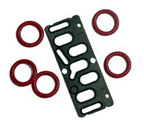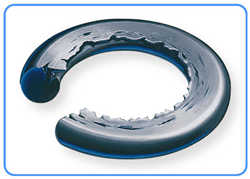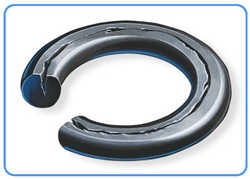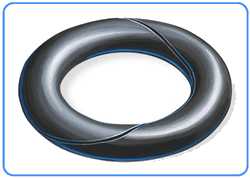
|
7108
S. Alton Way, Unit I |
(303) 758-2728
Home > O-ring, Seal Failure Analysis > Part 1
O-ring and Seal Failure Part 1
Extrusion, Over-Compression and Spiral Failure
|
Extrusion (and/or Nibbling) Description: The o-ring or seal develops ragged edges (generally on the low-pressure side) which appear tattered. Contributing Factors: Excessive clearances. Excessive pressure. Low-modulus/hardness elastomer. Excessive gland fill. Irregular clearance gaps. Sharp gland edges. Improper sizing. Suggested Solutions: Decrease clearances. Higher-modulus/hardness elastomer. Proper gland design. Use of polymer backup rings. |
|
|
Over-Compression Description: The o-ring or seal exhibits parallel flat surfaces (corresponding to the contact areas) and may develop circumferential splits within the flattened surfaces. Contributing Factors: Improper design-failure to account for thermal or chemical volume changes, or excessive compression. Suggested Solutions: Gland design should take into account material responses to chemical and thermal environments. |
|
|
Spiral Failure Description: The o-ring or seal exhibits cuts or marks which spiral around its circumference. Contributing Factors: Difficult or tight installation (static). Slow reciprocating speed. Low-modulus/hardness elastomer. Irregular O-ring surface finish (including excessive parting line). Excessive gland width. Irregular or rough gland surface finish. Inadequate lubrication. Suggested Solutions: Correct installation procedures. Higher modulus elastomer. Internally lubed elastomers. Proper gland design. Gland surface finish of 8-16 microinch RMS. And possible use of polymer backup rings. |
|
Next Topic: Chemical Degradation, Thermal Degradation and Explosive Decompression
We are located in the Denver Technological
Center in a suburb of Denver, Colorado
©1997-2017, Problem Solving Products, Inc.
Website Map | Privacy Statement
| Terms of Use




